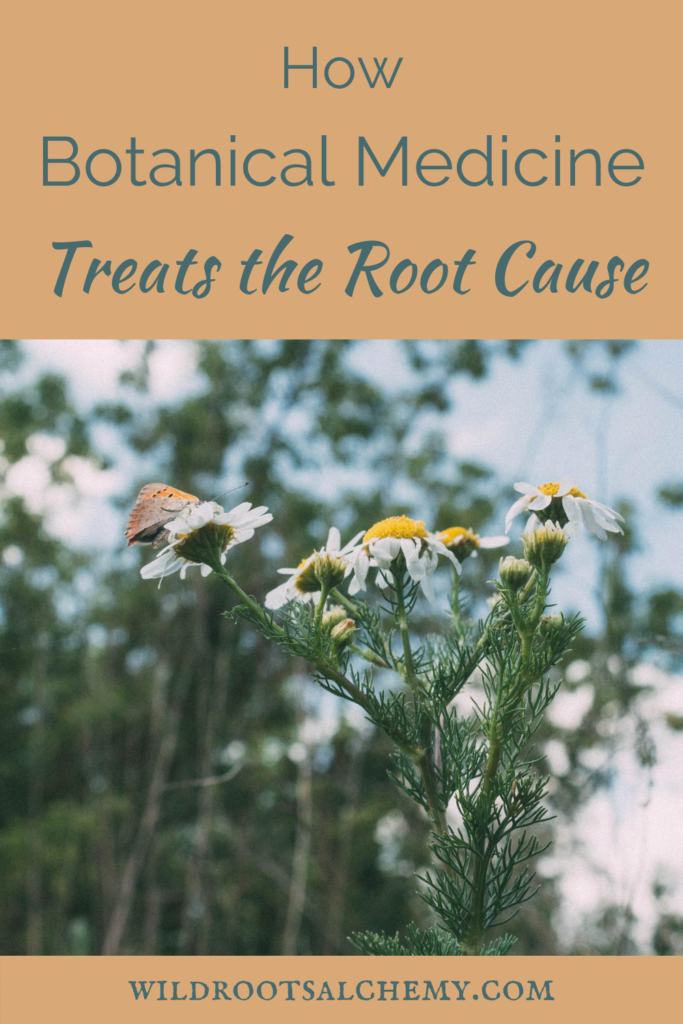
I read an Instagram post the other day saying that herbs aren’t treating the root cause.
My main thought was, well, this person isn’t working with plant medicine the right way!
If you “use” herbs like pharmaceutical drugs, then yes, you’re not often gong to be addressing the root cause. Pharmaceutical drugs aren’t root cause medicine, and neither are many standardized herbal products that have been reduced to their “active” constituents (they’re all active, my friends) or are taken in large pharmacological doses.
Pharmaceuticals are considered non-living (or dead) medicine. That isn’t to say they aren’t strong; quite the opposite. They act with full force with a given mechanism and often have a bunch of sloppy side effects because the drug exerts such a direct influence over the body without a guiding principle, and your living and incredibly wise body just doesn’t really know what to do with it.
Plants are living, intelligent beings. Just like you. Just like our Earth. I know I sound woo (I’m actually quite fond of that term…), but stick with me here.
Plants are our allies and our teachers during our time here on Earth. They have a wide array of phytochemicals that exert synergistic effects in our bodies. Think of the potent synergy of these chemicals as a signal or message that works on specific aspects of your organism and your spirit, and prompts your body to heal itself.
If you work with (instead of “use”) plant medicine, like you would work with other teachers, mentors, or guides, you will find that the plants teach you and your body how to be in this world. How to reconnect with Nature. How to restore both physiological and psychological balance (because the two are inseparable).
This is intelligent medicine. You work with it until you and your body have “learned the lesson” and then you may not need it anymore.
[FYI: You shouldn’t need to take anything long-term in order to be healthy. Yet sometimes we need to work with herbal medicine for days, months, or even years in order to heal. And yes, even though they aren’t health-promoting, pharmaceutical medications have their time and place, as all therapeutic interventions do.]
From a biomedical approach, we learn the specific molecular and cellular mechanisms from which herbs are supposed to work. However, this is looking at plant medicine from a pharmacological (and inherently reductionistic) model.
Like humans and other living beings, plants are complex organisms. There is so much more to their healing capacity than just plugging a molecular compound into a cell’s receptor site, creating an action within the body, and calling it a day.
There is also more to plant medicine than “What is this plant ‘good for’?” We do plant medicine a disservice when we focus on “anti-inflammatory” and “antimicrobial” herbs, because their healing capabilities are so much more varied, complex, and nuanced than that; so much more intelligent and deeply healing, rather than simply acting as band-aid or promoting a drug-like response in the body.
Let me give you an example of plant intelligence works.
Let’s say you are the type of person who gets restless and irritable. When you get anxious or stressed, you start to become impatient and perhaps even a little childish. You feel your nervousness and anxiety in your stomach, perhaps giving you abdominal cramps or an upset stomach.
Are there any herbs calling out to you? This is exactly the type of person who would benefit from Chamomile’s medicine. This person could work with Chamomile in several different way: drinking the tea, taking the herb in a tincture, smelling the plant’s aromatic little flowers out in the wild. But this person wouldn’t need to take Chamomile for the rest of their life, like a drug. Chamomile would essentially teach their body (primarily, their nervous system) how to let go of those patterns that have created their physical and mental/emotional symptoms, and re-learn a more balanced and healthy state of being in this world. That’s treating the root cause.
So yes, plant medicine CAN treat the root cause of disease. You just have to know how to work with it.
Photo in featured image courtesy of Oksana Simanovscaia.





